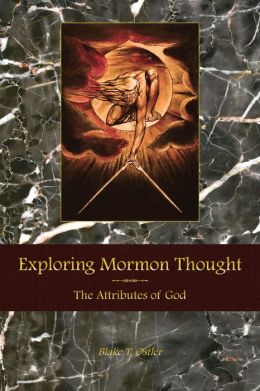At the moment, I'm reading Blake Ostler's
Exploring Mormon Thought: The Attributes of God, which addresses Mormon theology and how it fits in with other Christian theologies. Mormonism has some striking differences with traditional Christianity--the emphatic way we highlight that the trinity consists of three separate personages, the inclusion of the Book of Mormon in the scriptural canon, the historical practice of polygamy, and the (currently not widely professed) view that human beings have the potential to become as gods.
Before this I had read virtually no theology; while I had read some of Augustine's
Confessions and excerpts of Aquinas in college, in the context of my class we were viewing the texts more for how they approached the ineffable than for any theological conclusions.

As I was reading Ostler, at first I found I was distracted by the impression that he was trying too hard to invent a systematic theology where no such thing existed. For example, he acknowledges the widely documented Mormon view that God did NOT create
ex nihilo ("out of nothing"), but simply organized matter that already existed and that therefore he cannot force separate "intelligences" (which can refer to either individual people or even to matter) to act in any particular way--therefore they have free will, separate from God's ability to act upon them. He then attempts to reconcile this with seemingly contradictory scriptures like D&C 88:47--"God hath given a law to all things by which they move" (implying that God is the ultimate cause behind all other events brought about by other agents)--by stating intelligences have power to cause certain events to take place, but that God must lend them his power for this to occur. The intelligences therefore can act as free agents, but only with God lending his power simultaneously--something Ostler calls "concurrence". An interesting and creative conclusion to be sure, but definitely not something that must be universally arrived at, since it is not at all clear if this is what is meant by Mormon scripture or if it is what Mormon prophets had meant to convey. While one could argue that God may reveal truths without the complete understanding of his mouthpieces, there remains the question of whether this is even God's intended conclusion from combined Mormon discourses and scriptures. In other words, all interesting ideas, but not necessarily convincing and certainly not conclusive.
But then I realized that this systematizing of unsystematic utterances about God into a coherent theology is itself the discipline of theology, which is what Augustine and Aquinas and all the other theologians were up to themselves, taking biblical record, some of which is clearly self-contradictory, and trying to reconcile it with logic and what was known of science and philosophy. On the whole, Mormons have not always been friendly to such attempts, perceiving efforts to define theology from non-prophetic sources as inevitably tainted by human interference . Certainly the task theologians undertake is audacious--but is it worth doing? Does it add anything to the spiritual life?
My own thought is that reading arguments about the nature of God seems to do little to convince me about one view or another. I'm honestly really unsure about things like whether God is ultimately infinitely omnipotent or if such a thing is even possible (or desirable) and he is instead "maximally potent"; the more I read, the more I find new questions arising. But I've decided that I like reading theology because the way I experience the world and discover my beliefs is not just through inspired feeling, but by reasoned thinking and analytic reflection. In years past when I ignored difficult and thorny theological questions, it essentially meant that I was shutting off an important part of myself to God--and therefore my relationship with him felt boring and stagnant. And writing
that feels blasphemous, for I cannot believe that God himself is either of those things. So while I am very unsure if I agree with Ostler's conclusions about what Mormon theology is--or even what it should be--I'm very much appreciative of the exercise of considering these questions. Thinking about God turns out to be a devotional activity for me in much the same way that prayer and church attendance are; I'm turning my mind towards him in the same way I've always known to turn my heart.

